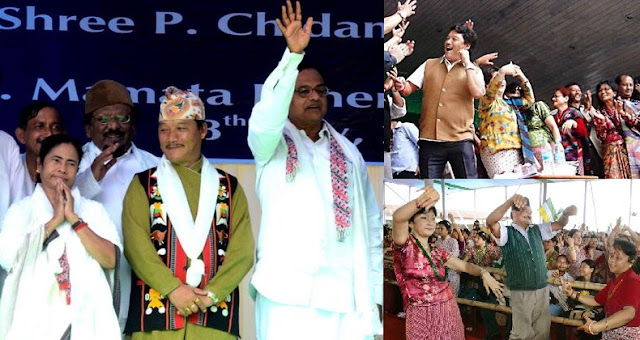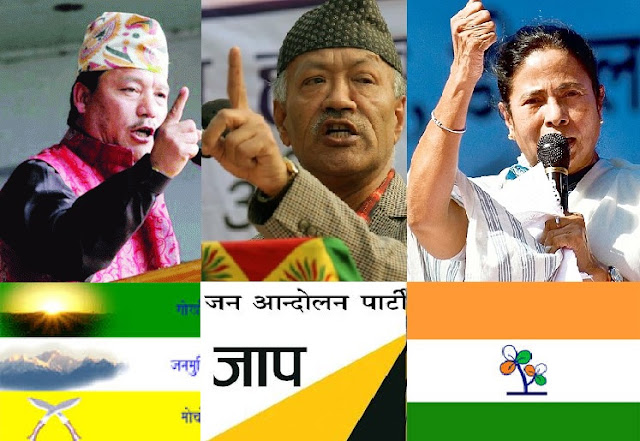Writes: Aishik Chanda
Simmering since 1907, the separate Gorkhaland agitation has flared up again. Mamata Banerjee’s ‘3-language policy’ making Bangla compulsory in schools in West Bengal and the Gorkha Janmukti Morcha’s opposition to it have combined to cause a volatile situation. Aishik Chanda explains
The hill districts of Darjeeling and Kalimpong in West Bengal are on the boil again over Mamata Banerjee’s decision to make Bangla compulsory in all schools of the State regardless of mediums or boards. Gorkha Janmukti Morcha (GJM), the party ruling the autonomous council Gorkha Territorial Administration (GTA) that governs the two districts, has taken to the streets, and burnt police vehicles, government offices and enforced an indefinite shutdown of government offices, banks and courts, terming the fight as that of ‘Gorkha existence’ against what it termed ‘Bengal’s slavery’.
Though the West Bengal chief minister said Bangla would not be imposed on the Nepali-speaking hills of north Bengal, the GJM wanted a Cabinet resolution regarding the same. With the GTA elections slated to be held in October, the GJM called the autonomous council a failure and demanded a Gorkhaland State. On the other hand, Banerjee constituted a six-member committee to conduct a special audit of the GTA to check misappropriation of Central funds to the autonomous council in the past five years.
What sparked the recent agitation in Darjeeling hills?
Mamata Banerjee declared in a Facebook post on May 16 that students have to opt for three languages out of a pool of seven official languages of West Bengal from Class I till Class X, of which one has
to be Bangla. She called this the ‘3-language policy’ of the State government and said it will be implemented in all schools in the State irrespective of their medium or board. The other two languages can be chosen from English, Hindi, Nepali, Santhali, Punjabi or
Urdu.
Has there been any official notification on making Bangla compulsory?
No. There has been no official circular regarding the implementation of the ‘3-language policy’ from the State government. The Jan Andolan Party (JAP), the GJM’s rival in Kalimpong district, has
distanced itself from the agitation and refused to call it a ‘language movement’ as no government order has been passed on making Bangla mandatory.
Is there any link between the agitation and polls in the recent past and the near future?
Maybe. Trinamool Congress broke into the GJM bastion and formed the board in Mirik municipality and won a few seats in Darjeeling, Kalimpong and Kurseong municipalities. The electoral setback had forced the GJM on the back foot in the hills. Also, the current term of the GTA is ending in July and the election to the 45-member body is expected in October. The TMC aims to break into this. Currently all members in the body are from the GJM. According to JAP chief Harka Bahadur Chhetri, Mamata Banerjee’s untimely decision to implement Bangla came as a boon in disguise for the cornered GJM.
What is the Gorkhaland statehood movement?
It is a century-old demand for separation of Nepali-speaking hills from Bengal. The present Gorkhaland statehood demand comprises Darjeeling and Kalimpong districts along with Bhaktinagar, Malbazar, Chalsa, Nagrakata, Banarhat, Birpara, Madarihat, Jaigaon, Kalchini and Kumargram blocks of Jalpaiguri and Alipurduar districts of north Bengal.
Were Darjeeling and Kalimpong historically a part of Bengal?
No. Darjeeling was a dominion of Chogyal of Sikkim and was overrun by Nepal in 1780.
The region was annexed by the British during the 1814 Anglo-Nepal War and was ceded by Nepal to British India in the Sugauli Treaty of 1815.
Kalimpong was a part of Bhutan and was ceded to the British in the Sinchula Treaty of 1865 after the 1864 Anglo-Bhutan War. The present Darjeeling district as part of Bengal came into being in 1866.
However, administratively it was classified as a ‘Non-regulated area’ before 1861 and 1870-74 and as ‘Regulated area’ between 1862 and 1870. It was termed as ‘Scheduled district’ in 1874, as ‘Backward Tracts’ in 1919 and ‘Partially-excluded area’ from 1935 till 1947.
When did the agitation for Gorkhaland begin?
The Hillmen Association of Darjeeling submitted a memorandum demanding a separate administrative setup of the hills to Morley-Minto Reforms in 1907, chief secretary of Bengal and secretary and viceroy of India in 1917 and to the Simon Commission in 1929. Akhil Bharatiya Gorkha League’s N B Gurung met Jawaharlal Nehr in 1952 at Kalimpong demanding separation from Bengal. Indra Bahadur Rai of Pranta Parishad met Indira Gandhi at Darjeeling demanding a separate State.
Did the Gorkhaland statehood demand witness bloodshed?
Yes. The Gorkhaland statehood movement turned into an armed rebellion led by Subhash Ghising of Gorkha National Liberation Front after large number of statehood agitators were killed in CRPF firing during a rally in Kalimpong on July 27, 1986. According to some estimates, more than 1,200 Gorkhas were killed during two years of violent armed rebellion. The GNLF made truce with the governments of West Bengal and India in 1988, leading to the formation of the autonomous Darjeeling Gorkha Hill Council (DGHC) led by Ghising. The movement saw peace from 1988 till 2007.
Did the ‘Indian Idol’ show renew the Gorkhaland movement in 2007?
Yes. Kolkata Police constable Prashant Tamang won ‘Indian Idol Season 3’ in 2007 after Subhash Ghising’s security guard Bimal Gurung mobilised Gorkhas to vote for Tamang. After gaining immense
popularity, Bimal Gurung formed the Gorkha Janmukti Morcha with the single-point agenda of forming the Gorkhaland state. Gurung eventually replaced Ghising as DGHC chief, which was renamed by the Left Front government as Gorkha Territorial Administration with the same powers.
What is the Madan Tamang murder case?
Influential veteran Gorkha leader Madan Tamang of Akhil Bharatiya Gorkha League (ABGL) was hacked to death in public at Darjeeling allegedly by GJM activists on May 21, 2010. Prime accused GJM chief Bimal Gurung and 17 others were tried at the Calcutta High Court and are currently out on anticipatory bail in the murder case.
What are ethnic development boards?
Stating that the Gorkhas were not indigenous to the Darjeeling hills and were better off than the native communities, West Bengal chief minister Mamata Banerjee formed the Lepcha Development Board in 2011 for betterment of the Lepcha tribe, who along with Limbu and other Animist and Buddhist tribes are said to be indigenous to the hills. Over the next six years, she formed 16 other development boards for different ethnicities of the hills. The GJM has always argued that the ethnic boards were a conspiracy to divide the Gorkhaland movement.
Does Gorkhaland creation require the West Bengal Legislative Assembly’s approval?
No. As witnessed during Telangana formation, creation of a new State does not require the approval of the parent State. So, if the Centre, which is witnessing peak of animosity with Mamata Banerjee
since demonetisation, brings a Bill in the Lok Sabha and Rajya Sabha for creation of Gorkhaland, they State may become reality. However, the Centre fears that granting statehood to Gorkhaland would intensify other statehood movements across the country.
Darjeeling district
Area
2,095.40 sq km
Population
15,95,163
(including plains of Siliguri subdivision)
Major towns
Siliguri, Darjeeling, Mirik, Kurseong, Naxalbari
Assembly seats
Darjeeling, Kurseong, Siliguri, Matigara-Naxalbari
Lok Sabha seat
Darjeeling
Kalimpong district
Area
1,053.60 sq km
Population
2,51,642
Major towns
Kalimpong, Gorubathan, Algarah
Assembly seats
Kalimpong
Lok Sabha seat
Darjeeling
[Via: New Indian Express]













